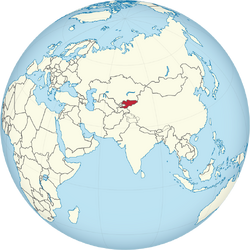|
Кыргыз Республикасы | |

|

|
| Anthem National Anthem of the Kyrgyz Republic | |
| Capital | Bishkek |
| Government | Republic and parliamentary democracy |
| President | |
| - From 2010 | Roza Otunbayeva |
| Prime Minister | |
| - From 2010 | Almazbek Atambayev |
| Legislature | Supreme Council |
| History | |
| - August 31, 1991 | Proclaimed |
| - December 25, 1991 | Recognized |
| Area | 199,900 km² |
| Population | |
| - 2009 | 5,482,000 |
| Density | 27.4/km² |
| GDP | 2009 (PPP) |
| - Total | US$ 12.8 billion |
| - Per capita | US$ 2,341 |
| Currency | Som |
| v | |
The Kyrgyz Republic is a parliamentary democracy in Central Asia.
Background
A Central Asian country of incredible natural beauty and proud nomadic traditions, most of Kyrgyzstan was formally annexed to Russia in 1876. The Kyrgyz staged a major revolt against the Tsarist Empire in 1916 in which almost one-sixth of the Kyrgyz population was killed. Kyrgyzstan became a Soviet republic in 1936 and achieved independence in 1991 when the USSR dissolved. Nationwide demonstrations in the spring of 2005 resulted in the ouster of President Askar AKAEV, who had run the country since 1990. Subsequent presidential elections in July 2005 were won overwhelmingly by former prime minister Kurmanbek BAKIEV. Over the next few years, the new president manipulated the parliament to accrue new powers for himself. In July 2009, after months of harassment against his opponents and media critics, BAKIEV won re-election in a presidential campaign that the international community deemed flawed. In April 2010, nationwide protests led to the resignation and expulsion of BAKIEV. He was replaced by President Roza OTUNBAEVA who will serve as president until 31 December 2011 according to a presidential decree issued 19 May 2010. Presidential elections are scheduled to be held in October 2011. Continuing concerns include: endemic corruption, poor interethnic relations, and terrorism.[1]
Economy
Kyrgyzstan is a poor, mountainous country with a dominant agricultural sector. Cotton, tobacco, wool, and meat are the main agricultural products, although only tobacco and cotton are exported in any quantity. Industrial exports include gold, mercury, uranium, natural gas, and electricity. The economy depends heavily on gold exports - mainly from output at the Kumtor gold mine. Following independence, Kyrgyzstan was progressive in carrying out market reforms, such as an improved regulatory system and land reform. Kyrgyzstan was the first Commonwealth of Independent States (CIS) country to be accepted into the World Trade Organization. Much of the government's stock in enterprises has been sold. Drops in production had been severe after the breakup of the Soviet Union in December 1991, but by mid-1995, production began to recover and exports began to increase. In 2005, the BAKIEV government and international financial institutions initiated a comprehensive medium-term poverty reduction and economic growth strategy. Bishkek agreed to pursue much needed tax reform and, in 2006, became eligible for the heavily indebted poor countries (HIPC) initiative. The government made steady strides in controlling its substantial fiscal deficit, nearly closing the gap between revenues and expenditures in 2006, before boosting expenditures more than 20% in 2007-08. GDP grew about 8% annually in 2007-08, partly due to higher gold prices internationally, but slowed to 2.3% in 2009. The overthrow of President BAKIEV in April, 2010 and subsequent ethnic clashes left hundreds dead and damaged infrastructure. Shrinking trade and agricultural production, as well as political instability, caused GDP to contract about 3.5% in 2010. The fiscal deficit widened to 11% of GDP, reflecting significant increases in crisis-related spending, including both rehabilitation of damaged infrastructure and bank recapitalization. Progress in reconstruction, fighting corruption, restructuring domestic industry, and attracting foreign aid and investment are key to future growth.[2]
President
- Roza Otunbayeva (₩) (April 7, 2010 - )
Prime Minister
- Almazbek Atambayev (₩) (December 17, 2010 - )
Nation
Kyrgyz Polities
Kyrgyzstan (1924-1991)
Neighbouring Nations
References
- Country Studies: Kyrgyzstan (Library of Congress)
- Kyrgyzstan: Guide to Law Online (Library of Congress)
- The World Factbook (CIA)
- Chiefs of State and Cabinet Members of Foreign Governments (CIA)
- U.S. Department of State
- Australian Government
- Inter-Parliamentary Union - Supreme Council
- BBC News Country Profile
- BBC News Time Line
- World Statesmen.org
- International Constitutional Law Project
- Psephos Election Archive
- Wikipedia
